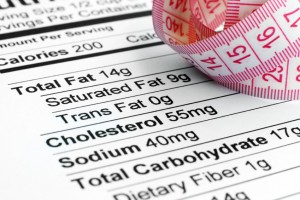A few years ago, trans fats were all over the news. Those artificial fats are made by mixing polyunsaturated oils with hydrogen gas so the oil solidifies and can be used in baking. In that process, the hydrogen molecules bond with the carbon molecules; this can happen in two ways.
 If the hydrogen molecules bond on the same side of the carbon molecule, the configuration is called “cis”. This puts a kink in the carbon chain, so the molecules cannot pack together and the product stays liquid at room temperature. But if the hydrogen molecules bond on opposite sites of the chain, the configuration is called “trans” and the carbon chain will be straight. The molecules pack together, and the oil becomes a solid at room temperature.
If the hydrogen molecules bond on the same side of the carbon molecule, the configuration is called “cis”. This puts a kink in the carbon chain, so the molecules cannot pack together and the product stays liquid at room temperature. But if the hydrogen molecules bond on opposite sites of the chain, the configuration is called “trans” and the carbon chain will be straight. The molecules pack together, and the oil becomes a solid at room temperature.
Trans fats are treated just like natural fats by your body. They are built into your cells, especially the cell membranes. That changes the structure and function of those membranes. Trans fat intake increases the risk of heart disease by raising low density lipoprotein (LDL) cholesterol. It also decreases the nutrient absorption capability of cell membranes, reduces the flexibility of your arteries, increases stroke risk, causes inflammation, changes hormone levels, is linked to aggression, and increases insulin levels. There is no known safe consumption level of trans fats, and they provide no known health benefits.
Some trans fats occur naturally in foods such as butter, but that type is good for you. Natural trans fats are converted to conjugated linoleic acid (CLA) in your body, which protects against heart disease and free radicals.
The FDA is now moving to ban artificial trans fats. In 2006, that agency required food manufacturers to declare the amount of trans fat in a product on food labels. Because of that step, and because manufacturers bowed to public opinion and changed the formulation of many of their foods, consumption of trans fats in the U.S. declined from 4.6 grams per day in 2003 to about 1 gram per day in 2012.
The FDA estimates that eliminating artificial trans fat from foods could prevent 20,000 heart attacks and 7,000 heart related deaths every year in this country. So the FDA is proposing to remove partially hydrogenated oils from the GRAS (generally regarded as safe) list.
A 60 day comment period has been set up for this change. After that period, the FDA will determine whether trans fats should be on the GRAS list. If it is removed, trans fats will become unapproved food additives and would be illegal to use in food unless a company could prove to the FDA that a specific use is safe under the “reasonable certainty of no harm” standard. Industry would be given time to phase out the use of this fake fat.
You can reduce your intake of trans fats right now by reading labels carefully. Unfortunately, a food that has up to 0.5 grams of trans fat per serving can state on the label that it has “0” trans fat. If you eat more than one serving of that product (which happens a lot), you can consume more than 1 gram of trans fat. To solve this problem, read the label and avoid any food that lists “partially hydrogenated oil” on the ingredient list.





“Trans fats will become unapproved food additives” as they should be, unless they are NATURALLY occurring. We have got to stop consuming items that our body does not recognize! Our bodies do not know what to do with them. Where are they stored? I, sadly, have come to terms with the fact that my generation will not out live my grandparents or possibly my parents ages at death. This is wrong, folks! Wake up!
I wrote the book The Everything No Trans Fats Cookbook so I have researched this topic. Trans fats have a half-life of 51 days, which means half of them leave your body through metabolism and excretion in 51 days. If you completely stop eating them tomorrow, it will be more than three months before your body is free of them. And some are built right into your cells, which is one of the reasons they cause so many problems.